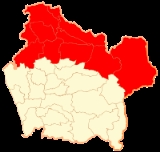
Malleco
Encyclopedia
Malleco Province is one of two provinces
in the southern Chile
an region of Araucanía
(IX). Its estimated population is 223,184 (2005), and it covers an area of 13433 sqkm. The provincial capital is the city of Angol
.
Malleco Province is known for having the emblematic Malleco Viaduct
and the Las Raíces Tunnel
, Chile's longest tunnel that links the eastern part of Malleco province to the rest of the province.
, Malleco comprises eleven communes, each administered by its respective municipality.
(INE), the province spans an area of 13433.3 sqkm and had a population of 201,615 inhabitants (100,227 men and 101,388 women), giving it a population density of 15 PD/sqkm. Of these, 139,261 (69.1%) lived in urban areas and 43,801 (21.7%) in rural areas. Between the 1992 and 2002 censuses, the population fell by 0.7% (1,422 persons).
Provinces of Chile
A province is the second largest administrative division in Chile, after a region. Each region is divided into provinces. There are 54 provinces in total....
in the southern Chile
Chile
Chile ,officially the Republic of Chile , is a country in South America occupying a long, narrow coastal strip between the Andes mountains to the east and the Pacific Ocean to the west. It borders Peru to the north, Bolivia to the northeast, Argentina to the east, and the Drake Passage in the far...
an region of Araucanía
Araucanía Region
The IX Araucanía Region is one of Chile's 15 first order administrative divisions and comprises two provinces: Malleco in the north and Cautín in the south....
(IX). Its estimated population is 223,184 (2005), and it covers an area of 13433 sqkm. The provincial capital is the city of Angol
Angol
Angol is a commune and capital city of the Malleco Province in the Araucanía Region of southern Chile. It is located at the foot of the Nahuelbuta Range and next to the Vergara River, that permitted communications by small boats to the Bío-Bío River and Concepción. This strategic position explains...
.
Malleco Province is known for having the emblematic Malleco Viaduct
Malleco Viaduct
The Malleco Viaduct is a railway bridge located in central Chile, passing over the Malleco River valley at the south entrance of Collipulli in the Araucania Region. It was opened by President José Manuel Balmaceda on October 26, 1890. At that time, it was the highest such bridge in the world...
and the Las Raíces Tunnel
Las Raíces Tunnel
Las Raíces Tunnel is the longest of the very few tunnels in the southern Andes and is the second longest of South America . It is located about 700 km south of Santiago de Chile on the paved Route 181-CH connecting the city of Temuco with the pass Pino Hachado towards Argentina...
, Chile's longest tunnel that links the eastern part of Malleco province to the rest of the province.
Communes
As one of Chile's second level administrative divisionsAdministrative divisions of Chile
The administrative division or territorial organization of Chile exemplifies characteristics of a unitary state. State administration is functionally and geographically decentralized, as appropriate for each authority in accordance with the law....
, Malleco comprises eleven communes, each administered by its respective municipality.
- Angol
- Renaico
- Collipulli
- LonquimayLonquimayLonquimay is a town and commune in the Malleco Province of southern Chile's Araucanía Region.- Transport :It is the terminus of an abandoned broad gauge railway project which supporters cited as the most practical railway route through the Andes to Argentina, but which lacks a link between...
- CuracautínCuracautínCuracautín, which means "Gathering Stone" in Mapudungun, is a commune and city in the Chilean province of Malleco. Curacautín is located 90 kilometres northeast of Temuco, in a valley near the volcanoes Tolhuaca, Lonquimay and Llaima, all of which can be seen from the city...
- ErcillaErcilla, ChileErcilla is a Chilean town and commune in the Malleco Province, Araucanía Region. Its name is a tribute to Alonso de Ercilla, who wrote La Araucana.-Demographics:...
- VictoriaVictoria, ChileVictoria is a city and commune in Malleco Province of Araucanía Region, Chile. It is the second most populous city in the province of Malleco, and is the gateway to the area known as Araucanía Andina, with attractions such as the Tolhuaca National Park , the Baths of Tolhuaca Malalcahuello National...
- TraiguénTraiguénTraiguén is a Chilean city and commune in the Malleco Province, Araucanía Region.-Demographics:According to the 2002 census of the National Statistics Institute, Traiguén spans an area of and has 19,534 inhabitants . Of these, 14,140 lived in urban areas and 5,394 in rural areas...
- LumacoLumacoLumaco is a town and commune in Malleco Province in the Araucanía Region of Chile. Its name in Mapudungun means "water of luma". Lumaco is located to northeast of Temuco and from Angol...
- PurénPurénPurén is a city and commune in Malleco Province of Araucanía Region, Chile. It is located in the west base of the Nahuelbuta mountain range . The economical activity of Purén is based in forest exploitation and agriculture...
- Los SaucesLos SaucesLos Sauces is a Chilean town and commune in the Malleco Province, Araucanía Region.-Demographics:According to the 2002 census of the National Statistics Institute, Los Sauces spans an area of and has 7,581 inhabitants . Of these, 3,638 lived in urban areas and 3,943 in rural areas...
Geography and demography
According to the 2002 census by the National Statistics InstituteNational Statistics Institute (Chile)
The National Statistics Institute of Chile is a state-run organization of the Government of Chile, created in the second half of the 19th century and tasked with performing a general census of population and housing, then collecting, producing and publishing official demographic statistics of...
(INE), the province spans an area of 13433.3 sqkm and had a population of 201,615 inhabitants (100,227 men and 101,388 women), giving it a population density of 15 PD/sqkm. Of these, 139,261 (69.1%) lived in urban areas and 43,801 (21.7%) in rural areas. Between the 1992 and 2002 censuses, the population fell by 0.7% (1,422 persons).

